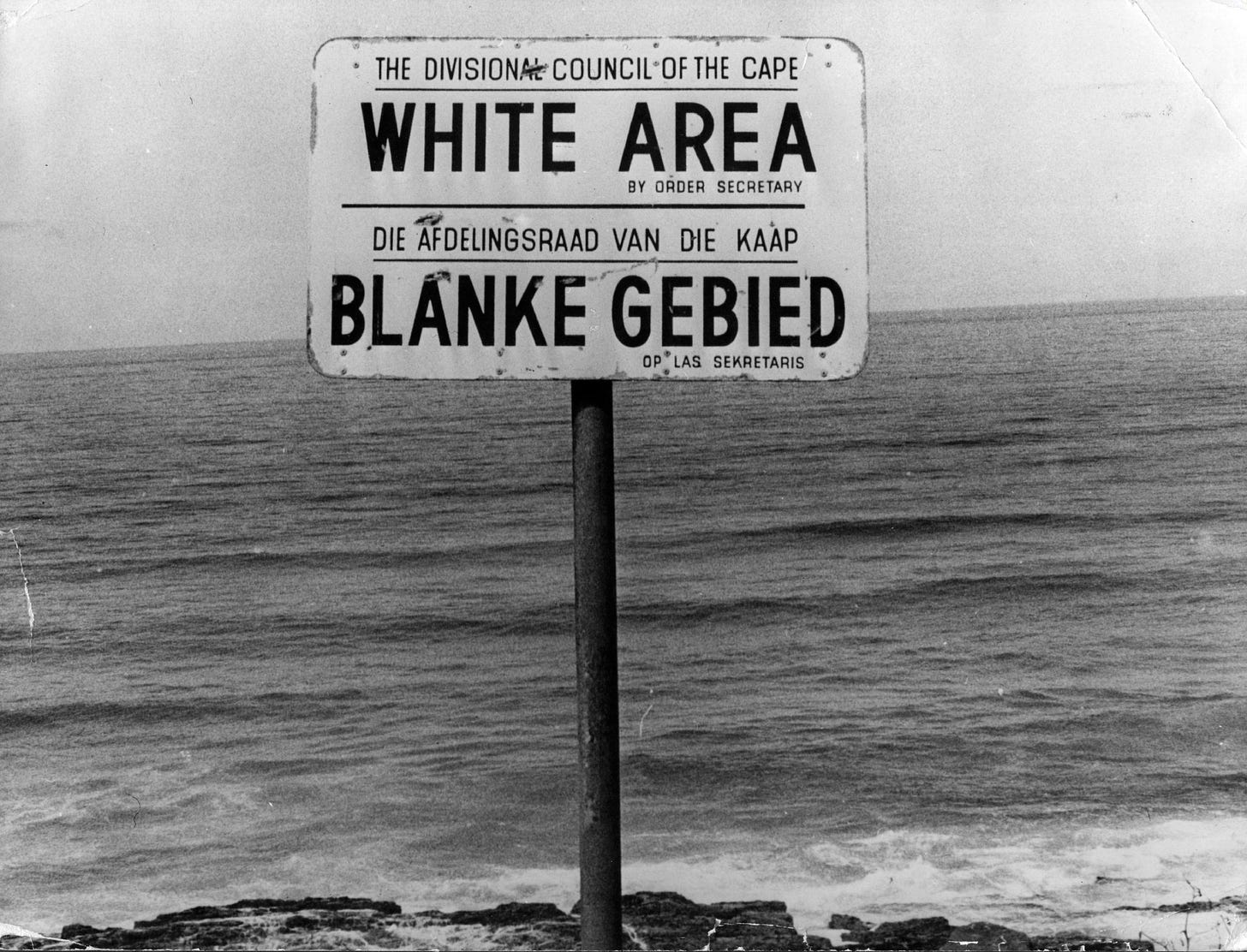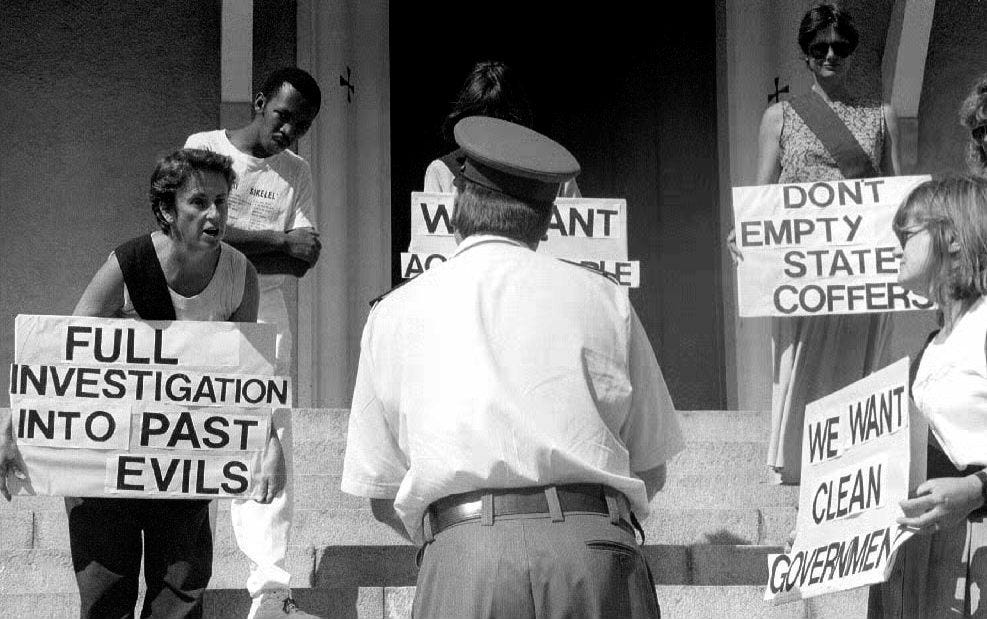The United States is now facing one of the more divisive eras of our history. We stand, one month after an insurrectionist ransacking of the Capitol, two days into the second impeachment trial of a one-term President, and face an unknowable stretch of time fighting a vicious pandemic. At times like this I like to turn to history. I find reassurance in the context of the past —oftentimes I can find lessons and wisdom to help guide a passage into the future. My thoughts today reach back to another time and place recovering from the injuries of a deep, painful, and bloody division. February 11, 1990 is a day I remember vividly and Nelson Mandela is a man I’ll never forget.
Thirty-one years ago, I had the opportunity to meet and interview Mandela just after he was released from prison. We met at his home —a place he had not lived in for more than a quarter of a century. What struck me first and deepest was his calm, self-deprecating, and often mildly humorous demeanor. He was soft spoken, and when he spoke it was much about forgiveness and the need for reconciliation in his country. Yes, there was a time in his past when he was about violence, seeking to effect change through violent acts. But here, he spoke of the future, the power of nonviolence, and how he was determined to be of help in the making of a new and better South Africa.
I had never met a person who was more forgiving. How could a man who had been so wronged speak so eloquently and forcefully for reconciliation? And yet, Mandela saw an urgent need for reunification, renewal, and moving forward.
For those who are unfamiliar or were not yet of memory-age, South Africa had upheld apartheid (meaning “apartness” in Afrikaans) from 1948 to 1990. This was a system of legislation and policies that sanctioned and institutionalized racial segregation, as well as political, social, and economic discrimination against the non-white majority population of South Africa.
Under apartheid, contact between white and nonwhite South Africans was limited. Restrictive policies were enacted including, but not limited to, the establishment of separate public facilities, political disenfranchisement, the forced removal of land from non-white South Africans, and a ban on interracial marriages. A combination of protests, pressure from the international community, and new leadership began dismantling the legal basis for apartheid under the administration of President F.W. de Klerk in 1990. De Klerk (who released Mandela from prison) would continue to work with Mandela to improve South Africa. Together, they won the Nobel Peace Prize in 1993. And eventually ran against each other in the 1994 national election (open to all races/enfranchised for all) before Mandela won handily to become the first Black president of South Africa.
These two men, once on opposing sides, had not let bitterness get in the way of progress for their country. But it is important to note that their progress did not come without reckoning. With the help of the Truth and Reconciliation Commission —the 1995 restorative justice body aimed on gathering and hearing evidence from both victims and perpetrators of apartheid— South Africa was able to contend with and heal from its ugly history. Not perfectly, but to an impressive degree.
Now, what worked in South Africa may or may not be a roadmap for better race relations in the United States of America. But it is at the very least, worth studying for lessons applicable here in our own country. It takes hard work and an even harder look within ourselves, to put this nation on a path towards the common good. But compromise is not reconciliation. We can’t unite until we have an accounting and remedying of the national sins that have brought us to this moment.
As much as we praise Mandela for his capacity to forgive (after 27 years imprisoned), it is noteworthy that he did not forget —and neither did his country. The violence against, and deprivation of, the humanity of the people of South Africa was not swept under the proverbial rug. It was held up to the light of day and examined in such a fashion that it could not be unknown, ignored, denied, or discredited. Furthermore, it was recorded for posterity (in the commission’s final report) so future generations could learn to never make the same mistake.
When asked about Mandela, I often say that I consider him one of, if not the, greatest leaders of the second half of the 20th century and the first decade of the 21st. And I believe that. Because in his determination to improve and unite South Africa, he taught us all about the transformative power of a forgiveness and reconciliation that is honest and unflinching.
Mandela would be the first to tell you he was far from perfect. And that should also give all of us hope. To be perfect is an impossible task. The very preamble to the founding charter of our nation speaks of forming a “more perfect union” —not perfect, but a path to an unattainable yet worthy goal. That’s the point. For it is in striving to be better that we become better.
I hope we, as a country, can find the discipline and wherewithal for a reconciliation that doesn’t shy away from etching in our collective memory what has been unjust, undemocratic, and inhumane in American history. To build a bridge across a divide, you need to know first, with utter clarity, the depths you must transverse. Mandela understood this. Let him be an inspiration for us as we seek our own path to truth and reconciliation.
—Dan
Our goal at STEADY to build a vibrant digital community —the more voices, perspectives, and viewpoints that can add to the conversation, the merrier. If you like what you’ve seen here, please consider subscribing and telling others to join as well.







During a discussion of Robert P. Jones' article, "Trump Can't Reduce the Reduce the Decline of White Christian America", someone in our Sunday school class commented that our country's experience with multiracial democracy is only fifty-five years. South Africa's even less and I learned that their Truth and Reconciliation Commission helped them. I don't recall much of what Mandela said when he was released but forgiveness may not have been central to his subsequent actions. Twenty-seven years earlier, he probably never imagined that South Africa would have a black president during his lifetime. When released, he emerged into a different situation, one where he could finally have a voice. He now had the opportunity to do what he had wanted to do for decades. Forgetting is often more important than forgiveness in letting go of anger. Forgiveness does not make sense when crimes are condoned instead of being brought to light. Forgiveness should not be at the expense of accountability, a cornerstone of democracy. I had wanted to write a book about the crime in which I find myself to help prevent this from ever happening to an innocent person again.
During a discussion of Robert P. Jones' article, "Trump Can't Reduce the Reduce the Decline of White Christian America", someone in our Sunday school class commented that our country's experience with multiracial democracy is only fifty-five years. South Africa's even less and I learned that their Truth and Reconciliation Commission helped them. I don't recall much of what Mandela said when he was released but forgiveness may not have been central to his subsequent actions. Twenty-seven years earlier, he probably never imagined that South Africa would have a black president during his lifetime. When released, he emerged into a different situation, one where he could finally have a voice. He now had the opportunity to do what he had wanted to do for decades. Forgetting is often more important than forgiveness in letting go of anger. Forgiveness does not make sense when crimes are condoned instead of being brought to light. Forgiveness should not be at the expense of accountability, a cornerstone of democracy. I had wanted to write a book about the crime in which I find myself to help prevent this from ever happening to an innocent person again.